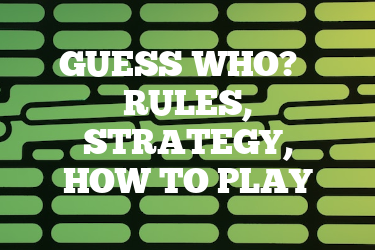Guess Who? Rules, Instructions & How to Win Strategy
Introduction
Guess Who? is a classic two-player board game that focuses on asking questions to narrow down a list of characters and figure out the opponent’s mystery person. It was first made in the 1970s and has been a favorite for families ever since. The game is simple to learn but can be tricky to get good at. I find it a perfect light-hearted intro to board games for most families.

Each player has a board with images of 24 people and their names. Players choose a card with a character from the deck, which represents the person their opponent has to guess. The goal is to be the first to guess the other player’s secret character by asking yes or no questions.
Quick Tip for Guess Who?
Start with broad questions to narrow down the options quickly, like “Does your person wear glasses?”
Rules for playing Guess Who?
The official rules of Guess Who? are straightforward. Each player starts by randomly picking a character card from the deck. This card is kept secret from the other player. Players take turns asking yes or no questions about the other’s secret character. Based on the answers, players flip down the characters on their board that don’t match the criteria.
This process of elimination continues until one player feels confident enough to guess the identity of the opponent’s character. If the guess is correct, that player wins. If not, they lose, and the other player wins.
Equipment and Setup for Guess Who?
To play Guess Who?, you need the game board, which includes two sets of 24 tiles with character images, 24 mystery cards (one for each character), and two player boards. To set up, each player sits opposite the other and flips up all the tiles on their board. Then, each player draws a mystery card from the deck, which will be the character the opponent has to guess.
How to Play Guess Who? and Game Mechanics
- Key Game Mechanics: Players use yes or no questions to eliminate unlikely characters from their boards.
- Setup: Players shuffle the character cards and draw one to place on their cardholder.
- Gameplay: Players take turns asking questions and flipping down tiles until someone is ready to guess.
- End of the Game: The game ends when a player makes a correct guess or the other player wins by default after a wrong guess.
How to Win at Guess Who?
To win at Guess Who?, it’s important to ask good questions. Start with broad questions that can eliminate many characters at once. Pay attention to the opponent’s questions and answers, as they can give clues about their character. Avoid asking too specific questions early on, as they are less likely to help narrow down the options.
The key to victory lies in asking effective yes-or-no questions to eliminate as many faces as possible with each inquiry. Start with broad characteristics that are likely to narrow down the field significantly, such as hair color, gender, or accessories (e.g., “Does your character wear glasses?”).
Pay careful attention to your opponent’s answers and ensure you accurately flip down the non-matching characters. I’ve definitely lost a game or two by not flipping down the right characters! As the game progresses, refine your questions to more specific features to pinpoint your opponent’s character.
Avoid asking questions that are too narrow early on, as they can waste your turn if the answer is no. Keep track of the questions asked and answers given to deduce patterns or potential bluffs from your opponent. Lastly, observe your opponent’s reactions for potential clues, but be prepared to take a calculated risk when making your final guess to clinch the win.
Best Strategies for playing Guess Who? game
One of the best strategies is to focus on distinctive features that are less common among the characters. For example, asking if the character has red hair can be more helpful than asking if they have brown hair, as fewer characters have red hair.
The objective is to guess the opponent’s chosen character by asking yes-or-no questions to narrow down the possibilities. One of the best strategies is to start with broad questions that can potentially eliminate a large group of characters, such as those related to physical characteristics (e.g., “Does your character have blonde hair?” or “Is your character wearing glasses?”).
Pay attention to the distribution of attributes among the characters to ask questions that are statistically most likely to divide the remaining options as evenly as possible. Avoid asking too specific questions early on, as they can result in a low elimination rate. As the game progresses and the number of possible characters diminishes, tailor your questions to be more specific based on the information you’ve gathered.
It’s also important to remember the answers given by your opponent to avoid redundant questions. A
dditionally, keep a poker face to avoid giving away clues about your own character and be prepared to bluff if you feel your opponent is close to guessing your character. By combining logical deduction with strategic questioning, you can increase your chances of winning at Guess Who?.
Scenarios
In a good scenario, you might have only a few characters left on your board, making it easier to guess correctly. In a bad scenario, you might have many characters left when your opponent has only a few. In this case, try to ask questions that can eliminate the most characters at once. If you’re behind, you might need to take a risk and make an early guess based on the information you have.
Frequently Asked Questions about playing Guess Who? game
- Q: Can I ask multiple questions in one turn? A: No, you can only ask one question per turn.
- Q: What if I accidentally flip down the wrong tile? A: If you realize the mistake before your next turn, you can correct it. Otherwise, you must continue with the game.
- Q: Can I guess at any time? A: Yes, you can guess the mystery person on your turn instead of asking a question.
Additional Tips and Tricks
Remember to keep track of which questions you’ve asked and the answers you’ve received. This will prevent you from wasting turns. Also, try to read your opponent’s reactions to your questions; sometimes, they can inadvertently give away information.
External Links
For more information on Guess Who? and to view the official rulebook, you can visit the Hasbro website here.

A digital native around since the early days of online gaming communities around 2001. An early contributor to the cult gaming site ClanTemplates, Adam has spent years giving free gaming resources to the community. With BoardCards, Adam is most experienced and commonly writing the articles on Strategy multi-player games like Settlers of Catan and Avalon. His first introduction to board games was via Mancala, an Egyptian-origin stone game and one of the oldest known games still played worldwide. Contact me via email



